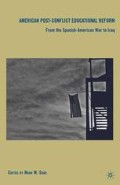Abstract
In one telling of the story, the transatlantic transfer of European civilization has created a new kind of democratic people who are haunted by an obligation to bring a similar conversion to other peoples around the world. After observing a review of Union troops in the midst of the American Civil War, the ardent abolitionist Julia Ward Howe penned the “Battle Hymn of the Republic,”2 which proposed that the distinctive American mission of war was to “to make men free.” Though this notion has not gone unquestioned and though the song itself has been satirized many times—for example, by Mark Twain who in 1901 suggested, “as Christ died to make men holy, let men die to make us rich”3 —the ideas it expresses have shown a curious resiliency across American history. The notion that Americans have a messianic duty to make others free recurs as a topic of cultural reflection and regularly informs policy and actions. National symbols and national narratives come out in spades in times of war, yet war sometimes also provides moments of clarity and insight into the composition of social imaginaries.4 Howe’s battle hymn provides one crystalline image of the American relationship to military conflict; the “Star-Spangled Banner,” which became the U.S. national anthem in 1931, provides another.
In the beauty of the lilies Christ was born across the sea, With a glory in his bosom that transfigures you and me: As he died to make men holy, let us die to make men free,
—Julia Ward Howe,
“Battle Hymn of the Republic” (1862)1
Access this chapter
Tax calculation will be finalised at checkout
Purchases are for personal use only
Preview
Unable to display preview. Download preview PDF.
Bibliography
Anderson, Benedict. Imagined Communities: Reflections on the Origin and Spread of Nationalism. Revised ed. London: Verso, 1991.
Berghahn, Volker R. “Philanthropy and Diplomacy in the ‘American Century.’” Diplomatic History 23, no. 3 (1999): 393–419.
Clayton, Thomas ed. Rethinking Hegemony, International Studies in Education and Social Change. Albert Park, Australia: James Nicholas Publishers, 2006.
Ferguson, Robert A. The American Enlightenment, 1750–1820. 1st ed. Cambridge, MA: Harvard University Press, 1997.
Heiss, M. A. “The Evolution of the Imperial Idea and U.S. National Identity.” Diplomatic History 26, no. 4 (2002): 511–540.
Howe, Julia Ward. “The Battle Hymn of the Republic.” The Atlantic Monthly 9, no. 52 (1862): 10.
Kaplan, Amy. The Anarchy ofEmpire in the Making of U.S. Culture, Convergences. Cambridge, MA: Harvard University Press, 2002.
Kaplan, Amy and Donald E. Pease. Cultures of United States imperialism, New Americanists. Durham: Duke University Press, 1993.
Kramer, Paul A. The Blood of Government: Race, Empire, the United States, & the Philippines. Chapel Hill: University of North Carolina Press, 2006.
LaFeber, Walter. The New Empire: An Interpretation of American Expansion, 1860–1898. Ithaca, NY: Published for the American Historical Association [by] Cornell University Press, 1967.
Maier, Charles S. Among Empires: American Ascendancy and Its Predecessors. Cambridge, MA: Harvard University Press, 2006.
Phillips, David and Kimberly Ochs, eds. Educational Policy Borrowing: Historical Perspectives. Oxford: Symposium Books, 2004.
Popkewitz, Thomas S. Inventing the Modern Self and John Dewey: Modernities and the Traveling of Pragmatism in Education. 1st ed. New York: Palgrave Macmillan, 2005.
Randall, Annie J. “A Censorship of Forgetting: Origins and Origin Myths of ‘Battle Hymn of the Republic,’” in Music, Power, and Politics, ed. Annie J. Randall, 5–24. New York: Routledge, 2005.
Rose, Nikolas S. Powers of Freedom: Reframing Political Thought. Cambridge, United Kingdom; New York: Cambridge University Press, 1999.
Said, Edward W. Orientalism. 1st ed. New York: Pantheon Books, 1978.
Sobe, Noah W. “An Historical Perspective on Coordinating Education Post-Conflict: Biopolitics, Governing at a Distance, and States of Exception.” Current Issues in Comparative Education 9, no. 2 (2007): 45–54.
Steiner-Khamsi, Gita ed. The Global Politics of Educational Borrowing and Lending. New York: Teachers College Press, 2004.
Stoler, Ann Laura. Haunted by Empire: Geographies of Intimacy in North American History, American Encounters/Global Interactions. Durham: Duke University Press, 2006.
Taylor, Charles. Modern Social Imaginaries. Durham: Duke University Press, 2004.
Twain, Mark. “Battle Hymn of the Republic [Brought Down to Date],” in Mark Twain’s Weapons of Satire: Anti-Imperialist Writings on the Philippine-American War, ed. Jim Zwick, 40–41. Syracuse, NY: Syracuse University Press, 1901/1992.
Williams, William Appleman. Empire as a Way of Life: An Essay on the Causes and Character of America’s Present Predicament, Along with a Few Thoughts About an Alternative. New York: Oxford University Press, 1980.
Willinsky, John. Learning to Divide the World: Education at Empire’s End. Minneapolis, MN: University of Minnesota Press, 1998.
Zimmerman, Jonathan. Innocents Abroad: American Teachers in the American Century. Cambridge, MA: Harvard University Press, 2006.
Editor information
Copyright information
© 2009 Noah W. Sobe
About this chapter
Cite this chapter
Sobe, N.W. (2009). American Imperatives, Educational Reconstruction and the Post-Conflict Promise. In: Sobe, N.W. (eds) American Post-Conflict Educational Reform. Palgrave Macmillan, New York. https://doi.org/10.1057/9780230101456_1
Download citation
DOI: https://doi.org/10.1057/9780230101456_1
Publisher Name: Palgrave Macmillan, New York
Print ISBN: 978-1-349-37951-4
Online ISBN: 978-0-230-10145-6
eBook Packages: Palgrave Social & Cultural Studies CollectionSocial Sciences (R0)

